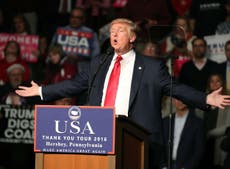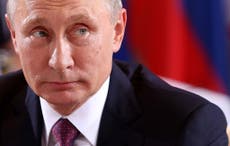The Syrian ceasefire agreement has shifted the balance of power to Assad
Turkey is giving priority to fighting the Kurds at home and abroad; getting rid of Assad is well down its political agenda


The new ceasefire in Syria will not mean an end to the shooting, but it marks a crucial development in the five-and-a-half year long civil war. It will not stop the killing because the biggest armed opposition groups — Isis and Jabhat al-Nusra — are not covered by the agreement, and have a strong motive for making sure that it fails. But what is most important about the ceasefire, which began on Thursday night and appeared at first to be taking hold, is not so much what is agreed as who is doing the agreeing.
According to a draft copy of the Russian-Turkish agreement, the Turkish government “guarantees the commitment of the opposition in all the areas that the opposition controls to the ceasefire, including any type of shelling”. Russia gives similar guarantees on behalf of the Syrian government and its allies.
These are bland words, but what is important here is that Turkey is distancing itself from the armed opposition groups who have depended on its support or tolerance since the uprising against Bashar al-Assad started in 2011. Without such backing, anti-Assad forces may be unable to withstand Syrian government offensives in future. In other words, there has been a decisive shift in the balance of power inside Syria against the rebels and in favour of Assad.
This was the real message of the defeat of the rebels in east Aleppo. Their former allies – Turkey, Saudi Arabia, Qatar and, on occasion, the US – did nothing to save them. Turkey is giving priority to fighting the Kurds at home and abroad; getting rid of Assad is well down its political agenda. In sharp contrast, Russia, Iran, Iraq and Hezbollah from Lebanon did everything to ensure that the Syrian army and its allies were victorious.
But the present ceasefire is not solely the result of Syrian and regional developments. The last hope of the non-Isis opposition in Syria and its foreign allies was that Hillary Clinton would win the presidential election and switch US policy to one more committed to getting rid of Assad and more hostile to Russia. Instead, they were horrified by the election of Donald Trump, a candidate even more dismissive of the non-Isis rebels, focused on destroying Isis and more favourable to a Russian alliance than President Obama.
Will the US acceptance of Russia playing a dominant role in Syria be capsized by new US sanctions against Moscow and the expulsion of 35 Russian diplomats? Probably not, because what Trump is proposing to do openly in Syria is not much different from what Obama was doing without publicity. It is a long time since the US was seriously interested in getting rid of Assad — it has instead been concentrating on defeating Isis. This is likely to continue under Trump and might even have done under Hillary Clinton, if she had become president. At this stage, US policy in Syria and Iraq would in any case be difficult to unglue.
But in a broader sense President Obama’s measures against Russia and Secretary of State John Kerry’s denunciation of Israeli policy towards the Palestinians will have an impact on every aspect of US foreign policy. This is less because of specific policy initiatives, which can be dismissed as the empty gestures of an expiring administration, but because Obama’s actions are evidence that political warfare in the US post-election is not going to de-escalate. There may be a shaky ceasefire in Syria, but there is none in Washington.
The Russian-US relationship in Syria will remain a mixture of rivalry and cooperation. The most important decisions here have already been taken by Obama when he did not intervene militarily against Assad in August 2013 and when he accepted Russian intervention in September 2015. But the degree of cooperation with Russia will remain in dispute between different power centres in Washington. This was already the case, which is why the Syria ceasefire negotiated by the US and Russia in September this year almost immediately collapsed in rancour. Both sides were acutely mistrustful of the other: the US claimed that Russian and Syrian planes had deliberately bombed an aid convoy bound for east Aleppo. The Russians and Syrian government suspected that US airstrikes had deliberately targeted and killed 62 Syrian soldiers near Deir Ezzor in eastern Syria.
The present Russian-Turkish ceasefire suffers from some of the weaknesses of the two previous Russian-US ones in February and September: several of the major combatants have not signed up and are unlikely to do so because the ceasefire is directed against them. But all three of the ceasefires of 2016 have been serious, even when they failed, because they have involved major players in the conflict: Russia, US, Turkey and, at one remove, Iran.
The interwoven crises in Syria are of nightmarish complexity and not all the arrows point towards peace. Turkey is backing away from supporting a war to overthrow Assad, but it is also weighing up the prospects for fighting the Syrian Kurds and eliminating their de facto state. President Bashar al-Assad has signed up to the latest ceasefire, but he makes no secret of his determination to retake all of Syria. He is probably waiting for the ceasefire to collapse because of its deficiencies before resuming the offensive.
Isis, which has been on the retreat in Syria and in Iraq, is by no means out of business. As east Aleppo was falling, its fighters recaptured Palmyra and advanced on an important Syrian airbase called T4. At the same time the Iraqi armed forces, so confident two months ago that they could retake Mosul quickly, are suffering heavy casualties in ferocious street fighting in the east of the city.
The Syrian and Iraqi wars are still full of nasty surprises for all participants, as the Trump presidency may soon find out for itself. Every crisis in the region is linked to every other. One of the biggest potential crises hanging over the Middle East is not Trump’s attitude to Russia, but to Iran. The role of Russia in Syria tends to be over-publicised and that of Iran, and its loose Shia coalition, tends to be under-reported. Up to the Russian military intervention in September 2015, it was the alliance with Iran that was most important to Assad. Iran certainly has not fought a long war in Syria, or in Iraq for that matter, to see the country impotent on the regional stage and divided up into zones of influence. Peace talks are to start soon in Astana, the capital of Kazakhstan, though the pro-Assad powers are not looking for power-sharing or compromise but a virtual surrender by the other side.
One does not have to spend long in Washington these days to find that, while there are many important people who detest Assad and Vladimir Putin, this feeling is far exceeded by the hatred they feel for the victors of the US presidential election. These divisions are bound to further envenom and shape policy decisions towards the crises and wars exploding in the Middle East.



Join our commenting forum
Join thought-provoking conversations, follow other Independent readers and see their replies